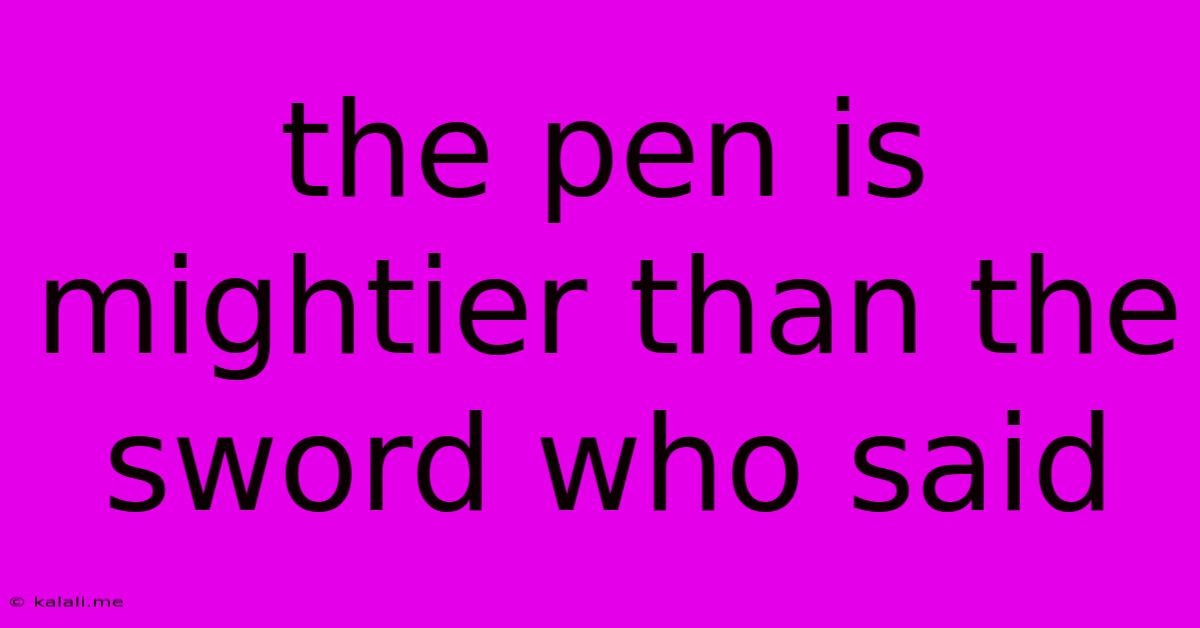The Pen Is Mightier Than The Sword Who Said
Kalali
May 22, 2025 · 3 min read

Table of Contents
The Pen is Mightier Than the Sword: Origin and Meaning
The famous adage, "The pen is mightier than the sword," resonates even today, reminding us of the power of words and ideas. But who first penned this potent phrase? And what does it truly mean in our modern world? This article delves into the origins, meaning, and enduring relevance of this powerful proverb.
Meta Description: Discover the origin of the famous quote "The pen is mightier than the sword," explore its meaning, and understand its continued relevance in today's world. Learn who said it and why it remains so impactful.
The Origin: Edward Bulwer-Lytton
While the sentiment behind the saying likely existed long before its formal articulation, the most widely accepted origin traces it back to Edward Bulwer-Lytton, a prolific 19th-century English novelist, playwright, and politician. He first used the phrase in his 1839 play, Richelieu; or, The Conspiracy. The exact line reads: "Beneath the rule of men entirely great, The pen is mightier than the sword."
This isn't a standalone quote, but rather part of a larger passage reflecting on the power of diplomacy and reasoned argument over brute force. Richelieu, the Cardinal, uses his intellect and persuasive writing to outmaneuver his enemies, demonstrating the strength of the written word.
Beyond the Stage: The Enduring Power of Words
The quote's enduring appeal lies in its simple yet profound message. The "sword" represents physical force, violence, and military might. The "pen," on the other hand, symbolizes intellectual power, communication, persuasion, and the ability to shape public opinion. Bulwer-Lytton suggests that ideas, expressed through writing, can be far more influential and lasting than any weapon.
This idea resonates across various contexts:
- Political influence: Powerful speeches, manifestos, and persuasive writing can inspire movements and change societies, much more effectively than any army. Think of the impact of Martin Luther King Jr.'s writings and speeches during the Civil Rights Movement.
- Social change: Literature, journalism, and essays can expose injustices, challenge norms, and ignite social change. The pen can be a tool for activism and social reform.
- Education and enlightenment: Knowledge disseminated through writing empowers individuals, fosters critical thinking, and drives progress.
- Creative expression: Writing allows us to explore ideas, express emotions, and connect with others on a deeper level. The power of storytelling can shape perspectives and build empathy.
Modern Interpretations: Beyond the Literal Pen
In the digital age, the "pen" has evolved. It now encompasses a multitude of communication tools: blogs, social media, online articles, emails, and more. The power to influence and persuade remains, but the reach is exponentially greater. The internet, a powerful tool for communication and information dissemination, both amplifies the power of the pen and presents new challenges related to misinformation and manipulation.
The core message of Bulwer-Lytton's quote, however, remains as relevant as ever. The ability to articulate ideas clearly, persuasively, and ethically is a potent force for positive change in the world. While the sword might achieve immediate results, the pen – in its various modern forms – builds a lasting legacy. The power to shape thought and inspire action remains the mightiest weapon of all.
Latest Posts
Latest Posts
-
Related To Doing Or To Do
May 23, 2025
-
Why Do These Cooked Potatoes Taste Sour
May 23, 2025
-
3z 5m 3 4m 2z
May 23, 2025
-
Death By A Thousand Paper Cuts
May 23, 2025
-
How To Remove Notification Ding On Mac
May 23, 2025
Related Post
Thank you for visiting our website which covers about The Pen Is Mightier Than The Sword Who Said . We hope the information provided has been useful to you. Feel free to contact us if you have any questions or need further assistance. See you next time and don't miss to bookmark.